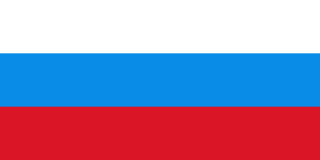
The modern history of Russia began with the Russian Republic of the Soviet Union gaining more political and economical autonomy amidst the imminent dissolution of the USSR during 1990–1991, proclaiming its sovereignty inside the Union in June 1990, and electing its first President Boris Yeltsin a year later. The Russian SFSR was the largest republic of the Soviet Union, but it had no significant independence before, being the only Soviet republic to not have its own branch of the Communist Party.

Yekaterinburg, alternatively romanized as Ekaterinburg and formerly known as Sverdlovsk, is a city and the administrative centre of Sverdlovsk Oblast and the Ural Federal District, Russia. The city is located on the Iset River between the Volga-Ural region and Siberia, with a population of roughly 1.5 million residents, up to 2.2 million residents in the urban agglomeration. Yekaterinburg is the fourth-largest city in Russia, the largest city in the Ural Federal District, and one of Russia's main cultural and industrial centres. Yekaterinburg has been dubbed the "Third capital of Russia", as it is ranked third by the size of its economy, culture, transportation and tourism.

Dmitriy Fyodorovich Ustinov was a Soviet politician and a Marshal of the Soviet Union during the Cold War. He served as a Central Committee secretary in charge of the Soviet military–industrial complex from 1965 to 1976 and as Minister of Defence of the Soviet Union from 1976 until his death in 1984.

Sverdlovsk Oblast is a federal subject of Russia located in the Ural Federal District. Its administrative center is the city of Yekaterinburg, formerly known as Sverdlovsk. Its population is 4,268,998.

Ipatiev House was a merchant's house in Yekaterinburg where the former Emperor Nicholas II of Russia, his family, and members of his household were executed in July 1918 following the Bolshevik Revolution. Its name is identical to that of the Ipatiev Monastery in Kostroma, from where the Romanovs came to the throne. As an act for the 60th anniversary of the Russian Revolutions, it was demolished in 1977 by orders of the Politburo to the local soviet government, almost 59 years after the Romanov family murder and 14 years before the dissolution of the Soviet Union itself.

Eduard Ergartovich Rossel is a Russian politician who served as Governor of Sverdlovsk Oblast from 1995 to 2009. From 2009 to 2022, he has served as a member of the Federation Council.
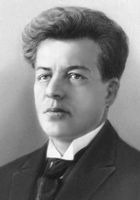
Pyotr Lazarevich Voykov was a Ukrainian Bolshevik revolutionary and Soviet diplomat known as one of the participants in the decision to execute the former Russian Emperor Nicholas II and his family members.

Ural is a geographical region located around the Ural Mountains, between the East European and West Siberian plains. It is considered a part of Eurasian Steppe, extending approximately from the North to the South; from the Arctic Ocean to the end of the Ural River near Orsk city. The border between Europe and Asia runs along the Eastern side of the Ural Mountains. Ural mostly lies within Russia but also includes a small part of Northwestern Kazakhstan. This is historical, not an official entity, with borders overlapping its Western Volga and Eastern Siberia neighboring regions. At some point in the past, parts of the currently existing Ural region were considered a gateway to Siberia, or even Siberia itself, and were combined with the Volga administrative the divisions. Today, there are two official namesake entities: the Ural Federal District and the Ural economic region. While the latter follows the historical borders, the former is a political product; the District omits Western Ural and includes Western Siberia instead.

The Ural State University is a public university located in the city of Yekaterinburg, Sverdlovsk Oblast, Russian Federation. Founded in 1920, it was an exclusive educational establishment made of several institutes which later became independent universities and schools.

The Yekaterinburg Metro is a rapid transit system that serves the city of Yekaterinburg, Russia. The Metro opened on 26 April 1991, and is 12.7 kilometres (7.9 mi) long and serves 9 stations. The Yekaterinburg Metro is the 13th and last metro to open in the USSR.

Industrialisation in the Soviet Union was a process of accelerated building-up of the industrial potential of the Soviet Union to reduce the economy's lag behind the developed capitalist states, which was carried out from May 1929 to June 1941.
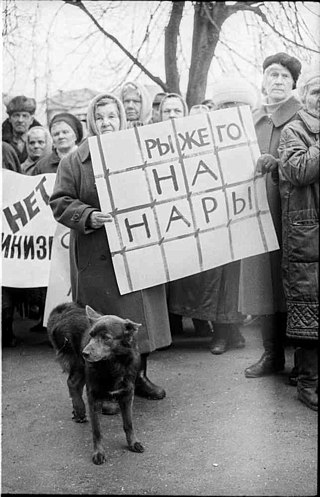
Privatization in Russia describes the series of post-Soviet reforms that resulted in large-scale privatization of Russia's state-owned assets, particularly in the industrial, energy, and financial sectors. Most privatization took place in the early and mid-1990s under Boris Yeltsin, who assumed the presidency following the dissolution of the Soviet Union.

Boris Nikolayevich Yeltsin was a Soviet and Russian politician who served as the first president of Russia from 1991 to 1999. He was a member of the Communist Party of the Soviet Union from 1961 to 1990. He later stood as a political independent, during which time he was viewed as being ideologically aligned with liberalism and Russian nationalism.
After the dissolution of the Soviet Union in 1991 and the end of its centrally-planned economy, the Russian Federation succeeded it under president Boris Yeltsin. The Russian government used policies of shock therapy to liberalize the economy as part of the transition to a market economy, causing a sustained economic recession. GDP per capita levels returned to their 1991 levels by the mid-2000s. The economy of Russia is much more stable today than in the early 1990s, but inflation still remains an issue. Historically and currently, the Russian economy has differed sharply from major developed economies because of its weak legal system, underdevelopment of modern economic activities, technological backwardness, and lower living standards.

Ural Federal University, named after the first President of Russia, B. N. Yeltsin, is an educational institution in the Ural region of Russia. The Ural Federal University was formed by a merger of the Ural State Technical University and Ural State University. It is one of 10 Russian Federal Universities. The university cooperates with the Russian Academy of Sciences and serves as a research and innovation center for the Ural region. UrFU offers educational programs in four areas of knowledge and 108 academic majors.

Zaporizhzhia Polytechnic National University is a Ukrainian university in Zaporizhzhia in Ukraine.
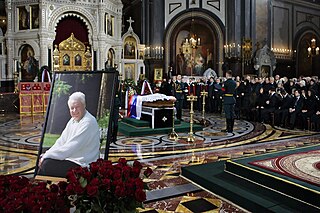
Boris Yeltsin, the first President of Russia, died of cardiac arrest on 23 April 2007, twelve days after being admitted to the Central Clinical Hospital in Moscow. Yeltsin was the first Russian head of state to be buried in a church ceremony since Emperor Alexander III, 113 years prior.

The Monument to Boris Yeltsin in Yekaterinburg is a monument to Boris Yeltsin, the first President of Russia, Soviet party, Russian political and state leader, one of the founders of postsoviet Russia, in Yekaterinburg, the oblast center of his native region where he lived and worked for a long time. The monument is located near Boris Yeltsin Presidential Center. The monument is regularly subject to vandalism.

Boris Vladimirovich Didkovsky was a Bolshevik revolutionary, Soviet geologist, teacher and rector of the Ural State University.
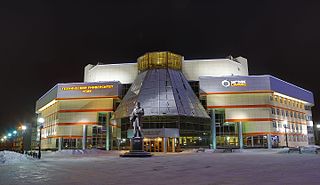
The Technical University of UMMC, abbreviated as UMMC TU, is a private technical college located in Verkhnyaya Pyshma, Sverdlovsk Oblast in Russia's Ural Federal District. Opened in 2013, the university is operated by the Ural Mining and Metallurgical Company and serves as a higher educational institution for industry workers.





















